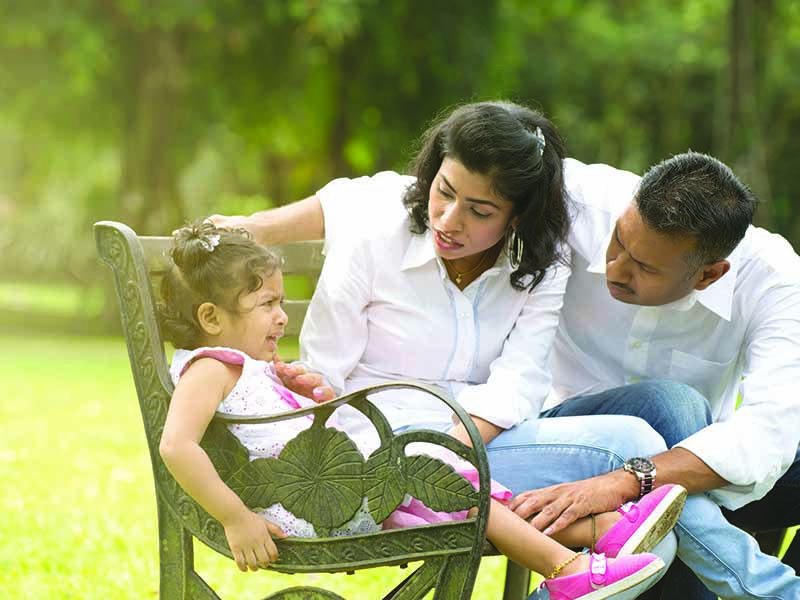– Dr. Tarun Singh is a paediatrician and newborn specialist at Max Hospital, Gurugram and Kalpavriksh Healthcare, Delhi
Here’s a guide to common toddler behaviour problems and practical tips to manage them successfully
Toddlers are often a handful to handle. Their high energy levels, curiosity, and still-developing sense of independence and language skills often prompt unpredictable behaviour such as temper tantrums, aggression and defiance. Managing them requires parental attention, tact and patience. Here’s a guide to common toddler behaviour problems and practical tips to manage them successfully.
Tantrums. Toddlers who struggle to communicate their feelings and/or cope with frustration display temper tantrums. They are a normal part of childhood development as children struggle to express emotions and assert their independence.
Aggression. Little ones tend to express themselves physically (throwing things, hitting others) because they lack the vocabulary to articulate their emotions. It could also stem from overstimulation or fatigue.
Defiance. Saying “no” is a child’s way of asserting control over her choices. It’s essential for developing independence and autonomy but can lead to challenging interaction with adults.
Clinging. Toddlers often display clingy behaviour, especially in new or unfamiliar situations. This is manifestation of seeking security and reassurance from trusted caregivers.
Refusal to share. Sharing doesn’t come naturally to little children since they are in an egocentric stage of development. It’s normal for them to protect what they view as their possessions.
Here are some ways to manage these common behaviour problems:
Remain calm and patient. Respond to tantrums/aggression with calmness. Take deep breaths and focus on addressing the problem without expressing exasperation. This also teaches toddlers how to regulate their emotions.
Set clear boundaries. Proclaim clear, consistent rules for acceptable behaviour. Use simple language to explain what’s expected, such as “Hands are for shaking, not hitting.”
Encourage communication. Encourage children to express themselves by teaching simple words for expressing their emotions such as “sad,” “angry,” or “tired.” This empowers them to communicate without resorting to aggression. Give a hug of reassurance or some comforting action when they express these emotions.
Offer choices. Give toddlers a sense of control by offering choices within acceptable limits. For instance, ask “Do you want to wear the blue or red shirt?”
Be a role model. Demonstrate positive behaviour, such as sharing, apologising, or using kind words. Toddlers learn by observing and emulating adults around them.
Distract and redirect attention. When a preschooler shows signs of distress or frustration, gently divert her attention to a new activity or toy. Distraction defuses situations before they escalate.
Praise positive behaviour. Reinforce good behaviour by offering praise and encouragement. Specific affirmations such as “Great job sharing your toy!” enables toddlers to understand what they’re doing is right.
Set routines. Predictable routines generate a sense of security. Regular meals, naps, and playtimes help children learn what to expect and reduce behaviour issues prompted by fatigue and hunger.
Use time-outs sparingly. Time-outs (aka grounding) can be effective, but should be used sparingly and as a calm-down opportunity rather than a punishment. A brief time-out helps toddlers reset and understand consequences of misbehaviour.
Express empathy and reassurance. Acknowledge your toddler’s sentiments to build trust and connection. For instance by saying “I see that you’re upset; let’s figure it out together.” It helps them feel understood and supported.
Seek professional help. While tantrums and aggressive behaviour are not unusual in early childhood, extreme and persistent bad behaviour warrants professional guidance. Consult a paediatrician or child psychologist if child aggression leads to serious physical harm, consistent lack of communication or interaction and signs of developmental delays.
Parenting toddlers is both demanding and rewarding. Parents need to invest time in ascertaining the causes of little ones’ aberrant behaviour and customise coping strategies suited to their development stage to nurture well-adjusted and emotionally secure children.

























